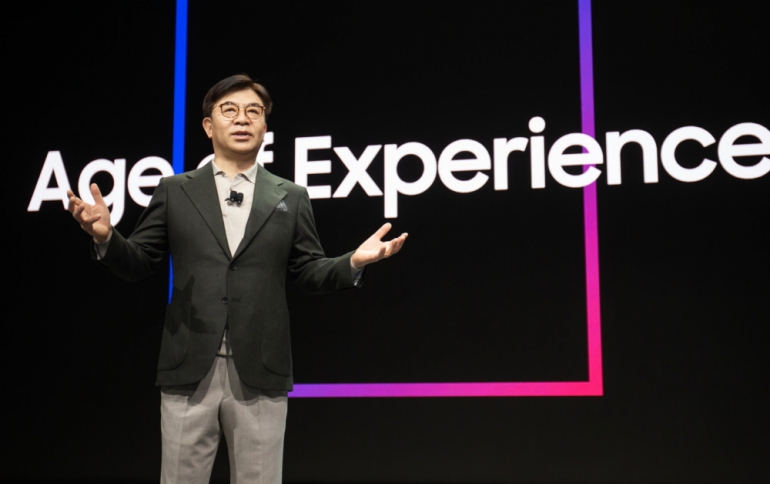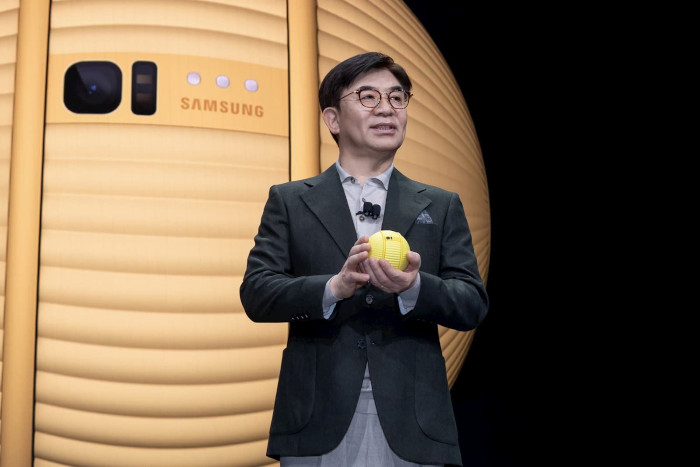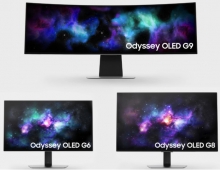
Samsung Showcases Galaxy Home Mini Smart Speaker, AR Glasses, AI Humans at CES
Samsung Electronics Co. kicked off 2020 with an array of gadgets -- from prototype augmented-reality glasses, a personal care robot, AI-powered home of the future and the highly anticipated Galaxy Home Mini smart speaker.
The world’s biggest home appliance maker set out its latest Internet of Things strategy, describing it as an “Age of Experience,” at the CES 2020 technology conference in Las Vegas. It will span everything from individual care to the connected home and smart cities in the next decade. At the heart of Samsung’s new smart home push will be the Galaxy Home Mini smart speaker, which the company plans to release in early 2020, said Hyunsuk Kim, chief executive officer of Samsung’s consumer electronics division.
“We need to rethink the space we have to accommodate our diverse and evolving lifestyles and generations,” said Kim during the opening CES keynote address. Along with artificial intelligence-driven concept products like the Ballie rolling bot, Samsung also showcased tech solutions for visually impaired and disabled people under the broad banner of technology enhancing people’s lives.
The Galaxy Home Mini comes years after Samsung’s had initially promised, but the Korean giant believes it can build a unique ecosystem around the Mini by making it the best controlling device for the home gadgets and appliances that bear its brand.
Powered by the Bixby digital assistants, Samsung’s offering will focus on making home appliances execute voice commands rather than attempting a conversation based on artificial intelligence trained on reams of internet user data. Kim said orchestrating a smooth question-and-answer exchange wasn’t his priority, while the focus on hardware over user information means better consumer privacy.
Kim is testing the Galaxy Home Mini in his own, connecting it to 63 devices that include his curtains, lighting and third-party gadgets. Appliances linked to the Mini will be able to carry out orders such as scheduling when the dishwasher should run or making sure the washer’s rinse cycle is complete before the user gets home.
Samsung lacks third-party support, but the company believes it can penetrate into the AI speaker market by virtue of its own product portfolio.
Samsung also teased with its own AR glasses, seeking to succeed where Google Glass failed. The company is working to minimize dizziness, said Kim, which is the key to making the glasses as small as possible. Apple and Facebook are both working on AR glasses of their own, and Microsoft offers the HoloLens headset.
Samsung is also working on peripheral gadgets, including the Ballie -- a companion robot in the vein of Sony’s Aibo that rolls around like BB-8 in Star Wars. Ballie is a small, rolling robot that understands you, supports you, and reacts to your needs to be actively helpful around the house. This experimental spherical robot echoes the LG Rolling Bot concept of 2016, aimed at monitoring the home and entertaining pets. It’s two years away from any consumer offering and would come in various colors and soft textures to withstand rough play. Kim expects both smart speakers and mobile robots will become major products in the consumer electronics market, offering a variety of services tailored to pet, child and elderly care.


Sebastian Seung, Executive Vice President and Chief Research Scientist at Samsung Electronics elaborated on Ballie, explaining that its On-Device AI capabilities enable it to be a fitness assistant and a mobile interface that seeks solutions for people’s changing needs. It does all this while maintaining stringent data protection and privacy standards.
“We believe AI is the future of personalized care,” stated Dr. Seung. “We see on-device AI as central to truly personalized experiences. On-device AI puts you in control of your information and protects your privacy, while still delivering the power of personalization.”
“Eventually, I hope there is no interaction between humans and technology,” Samsung home IoT chief Koo said with respect to what the smart home may look like in 2030. Devices will anticipate people’s needs and offer services based on data collected from in-house appliances, he said. “At least within the boundary of smart homes, technology development will head toward touch-less and voice-less.”
One thing in Samsung’s favor in realizing that vision, Kim said, is a more hands-off approach to consumer data than internet-based rivals that have in past years hoovered up users’ personal information to improve their services.
Kim said Samsung is putting an emphasis on safeguarding privacy by doing the necessary computations on the device itself -- the so-called edge computing -- removing the need for user information to ever leave the smart appliance or user’s home. Unlike advertising-reliant businesses like Facebook and Google, Samsung doesn’t need to build out intimately detailed user profiles to help it target ads. Consumers will get to choose whether to share data with the cloud to access additional services or just save data on their devices, Kim said.
Samsung is also showcasing advanced and personalized health solutions. For example, the company has collaborated with Kaiser Permanente to develop a home-based, virtual cardiac rehabilitation solution that pairs a Samsung smartwatch with a smartphone via Bluetooth. Samsung’s HeartWise application sends reminders to the patient to exercise, collects activity data, and continuously displays the patient’s heart rate during workouts. This data is automatically uploaded via the smartphone to the patient’s chart so that clinicians, case managers and physical therapists can track the patient’s progress and engage with them accordingly.
The program enables users to partake in cardiac rehabilitation at home without taking time out of their everyday lives to travel to a hospital or medical clinic. The positive results of the home-based cardiac rehabilitation program were published in the New England Journal of Medicine (NEJM) Catalyst last year.
Samsung experimental research arm has brought to CES 2020 a demonstration of what it calls the world’s first artificial human, a virtual simulation of a human intelligence that learns, converses and sympathizes like a regular person.
Each simulated human -- which would exist only on screens, not in the real world -- would be called NEON, and Samsung’s concept is that they would grow to develop believable personalities that would eventually make them friendly companions, yoga instructors, TV anchors and spokespeople.
“NEON is like a new kind of life,” said Pranav Mistry, chief executive officer of STAR Labs, short for Samsung Technology & Advanced Research. “There are millions of species on our planet and we hope to add one more. NEONs will be our friends, collaborators, and companions, continually learning, evolving, and forming memories from their interactions.”
Samsung is developing that’s called CORE R3, standing for Reality, Realtime and Responsive. Using neural networks and other artificial intelligence techniques, CORE R3 has been trained up with information about how humans look, behave and interact and “can computationally create lifelike reality that is beyond normal perception to distinguish,” according to STAR Labs.
Federico Casalegno, Chief Design Innovation Officer of Samsung Design Innovation Center, stated that the home will offer unique, immersive experiences with cutting-edge innovations like AI, sensors and data analysis: “As a living organism, the intelligent home will be a deeply personal space, tailoring experiences for each of us, according to our personal needs.”
Dr. Casalegno highlighted how spatial boundaries of the physical and digital worlds are dissolving, transforming living spaces into bespoke experience-spaces, like an art gallery, yoga studio or other forms of imaginable space.
He led the first-ever demonstration involving Samsung’s GEMS (Gait Enhancing & Motivating System) technology. The demonstration showed how consumers can use AR glasses to work out with a virtual personal trainer, climb a mountain or walk underwater, from the comfort of their living room, while GEMS aggregated and analyzed results to give personalized action recommendations.
Samsung also outlined its smart cities vision, where intelligent systems enabled by smart devices, platforms and data, will make city life much safer and easier. Emily Becher, Senior Vice President and Head of Samsung NEXT Global, said, “We have the tools and the knowledge to create intelligent systems that make living in the city more engaging, safe, and efficient – so that our children, and their children after that can love living in their cities as much as so many of us do today.” She added, “Smart cities that utilize AI, IoT and 5G will transform how we interact with the surrounding environment in ways that maximize convenience and enjoyment”.
With IoT technology expanding its reach beyond the home to all types of buildings, Samsung’s core vision lies in saving energy, cutting down emissions and helping to achieve sustainability as populations grow.
Smart buildings will also make life more connected and convenient. For example, smart building residents will be able to call elevators, turn lights off, manage deliveries or check for parking spots with a simple swipe or voice command. Intelligent appliances installed in smart buildings will request repairs and address problems before residents even notice the issue.
The company is working towards building partnerships with builders and property managers like Greystar Real Estate Partners, a leading U.S.-based global real estate developer, with which it will devise smart building solutions. “With smart buildings, the residents’ experience will get smarter, more efficient, more effective, so they utilize less energy,” said Bob Faith, Chairman and CEO of Greystar. “Samsung has the ability to bring all the technologies together and that convergence of the technologies in one place is really critical.”





















